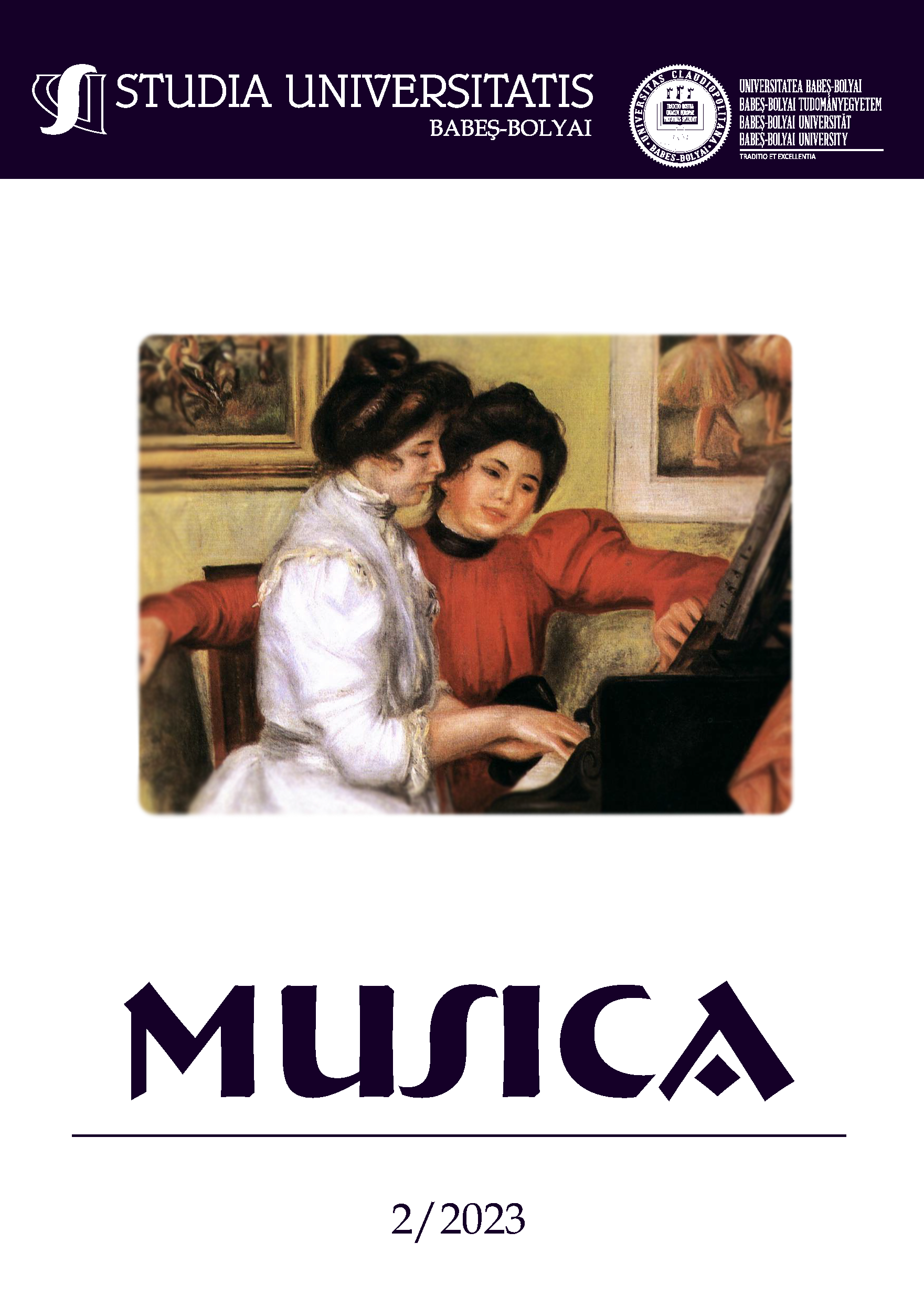The Proportion and Importance of Folk Music in Piano Method Volume 1 and 2
DOI:
https://doi.org/10.24193/subbmusica.2023.2.26Keywords:
Hungarian folk music, Piano Method, piano teaching, piano methodology.Abstract
The study focuses on the folk music aspect of Piano Method Volume 1 and 2, which are still widely used in Hungarian piano teaching. It examines the proportion and function of Hungarian folk songs in the volumes. It sheds light on folk songs appearing in different phases of piano teaching and their methodological possibilities of use.References
Ábrahám, Mariann. Két világrész tanára. (Teacher of Two Continents). Private publishing, Budapest, 1991 (ISBN 963 400 6868).
Bartók, Béla. Népzenénk és a szomszéd népek zenéje. (Our Folk Music and the Music of Neighbour Nations). Zeneműkiadó, Budapest, 1952.
Bartók összegyűjtött írásai. (Collected Writings of Bartók). Published by András Szőllősy. Zeneműkiadó, Budapest, 1966 (ISBN 963 330 6752).
Bárdos, Lajos. Írások népzenénkről. (Writings about Our Folk Music). Tankönyvkiadó, Budapest, 1988 (ISBN 963 18 0947 1).
Czövek, Erna. Emberközpontú zenetanítás. (Teaching of Music in a Human-centred Way). Zeneműkiadó, Budapest, 1975 (ISBN 963 330 130 0).
Czövek, Erna. Kodály pedagógiai hatása a hangszeres tanításra. (Kodály's Pedagogical Influence on Instrumental Teaching). In Parlando. 1968.
Dobszay, László. Szolfézs és a hangszer kapcsolatáról. (On the Relationship between Solfege and the Instrument). In: Parlando 1963/3.
Gát, József. Zongorametodika. (Piano Methodology). Zeneműkiadó, Budapest, 1964 (ISBN 963 330 226 9).
Iratok a magyar zeneoktatás történetéhez 1945-1956. (Documents on the History of Hungarian Music Education 1945-1956), edited by Melinda Berlász and Tibor Tallián. MTA Institute of Musicology, Budapest, 1984.
Kovács, Béláné. Zongoratanítás a XXI. század küszöbén. (Teaching Piano on the Beginning of the 21st century). Parlando. 1998/6. pp. 33-36.
Kulcsár, Zoltán. A szolfézs és a hangszeres tanítás kapcsolatáról. (On the Relationship between Solfege and Instrumental Teaching). In Parlando 1963/11.
Neuhaus, G.G. A zongorajáték művészete. (The Art of Piano Playing). Zeneműkiadó Budapest, 1985.
Szőnyi, Erzsébet. Kodály Zoltán nevelési eszméi. (The Educational Ideas of Zoltán Kodály). Tankönyvkiadó, Budapest, 1984.
S. Szabó, Márta. A kodályi eszmék a XXI. században. (The Kodály Ideas in the 21st Century). In Parlando 2007/6.
Teöke Marianne. A zongoratanításról. (On Piano Teaching). Nemzeti Tankönyvkiadó, 1994 (ISBN 963 18 5477 9).
Ujfalussy, József. Zeneoktatás és nemzeti hagyomány. (Music Education and National Tradition). In. Parlando 1984/1.
Várady, Krisztina. A hangok világa szolfézskönyv-sorozat megjelenésének korabeli időszerűsége (VI/1) A “kodályi elvek” megjelenése a korabeli szolfézskiadványokban. (László Dobszay: The World of Tones Solfége Book Series and the Timeliness of the Contemporary Edition (VI/1) The Appearance of Kodály Principles in Contemporary Solfege Sheets.) Parlando, 2017/2.
Várady, Krisztina. Dobszay László: A hangok világa c. sorozat köteteinek általános felépítése és tartalma. (General Structure and Content of László Dobszay: The World of Tones. In: Parlando, 2017/3.
Várady, Krisztina. Kötöttség és szabadság. Kodály: Gyermektáncok, 24 kis kánon a fekete billentyűkön. (Bounds and Freedom, Kodály: Children’s dances, 24 Little Canons on the Black Keys). In.: In the Memory of Kodály. Collection of Studies of the Department of Vocal Music of Eszterházy Károly University. Edited by: Judit Csüllög, Krisztina Várady. Líceum Publisher, Eger, 2020.
Varró, Margit. Zongoratanítás és zenei nevelés. (Piano Teaching and Music Education). Zeneműkiadó, Budapest, 1989 (ISBN 963 330 693 0).
Varró, Margit. Tanulmányok, előadások, visszaemlékezések. (Studies, Lectures, Reminiscences). Zeneműkiadó, Budapest, 1980.
Varró Margit és a XXI. század. (Margit Varró and the 21st century) - Studies, Reminiscences. Edited by Mariann Ábrahám, Society of Music Teachers, Budapest, Hungary (ISBN 963 03 9685 8).
Zongoraiskola 1. (Piano Method Volume 1). ed. Mária Fantóné Kassai, Lajosné Hernádi, Aladárné Komjáthy, Miklósné Máthé, Katalin V. Inselt) Editio Musica Budapest, Cop.1966. Z. 5229.
Zongoraiskola 2. (Piano Method Volume 2). ed. Aladárné Komjáthy, Zsuzsa Hernádi, Katalin Inselt, Mária Fantóné Kassai) Editio Musica Budapest Cop. 1967. p. 5242.
Downloads
Published
How to Cite
Issue
Section
License
Copyright (c) 2023 Studia Universitatis Babeș-Bolyai Musica

This work is licensed under a Creative Commons Attribution-NonCommercial-NoDerivatives 4.0 International License.






